Impact Report – 2023-2024
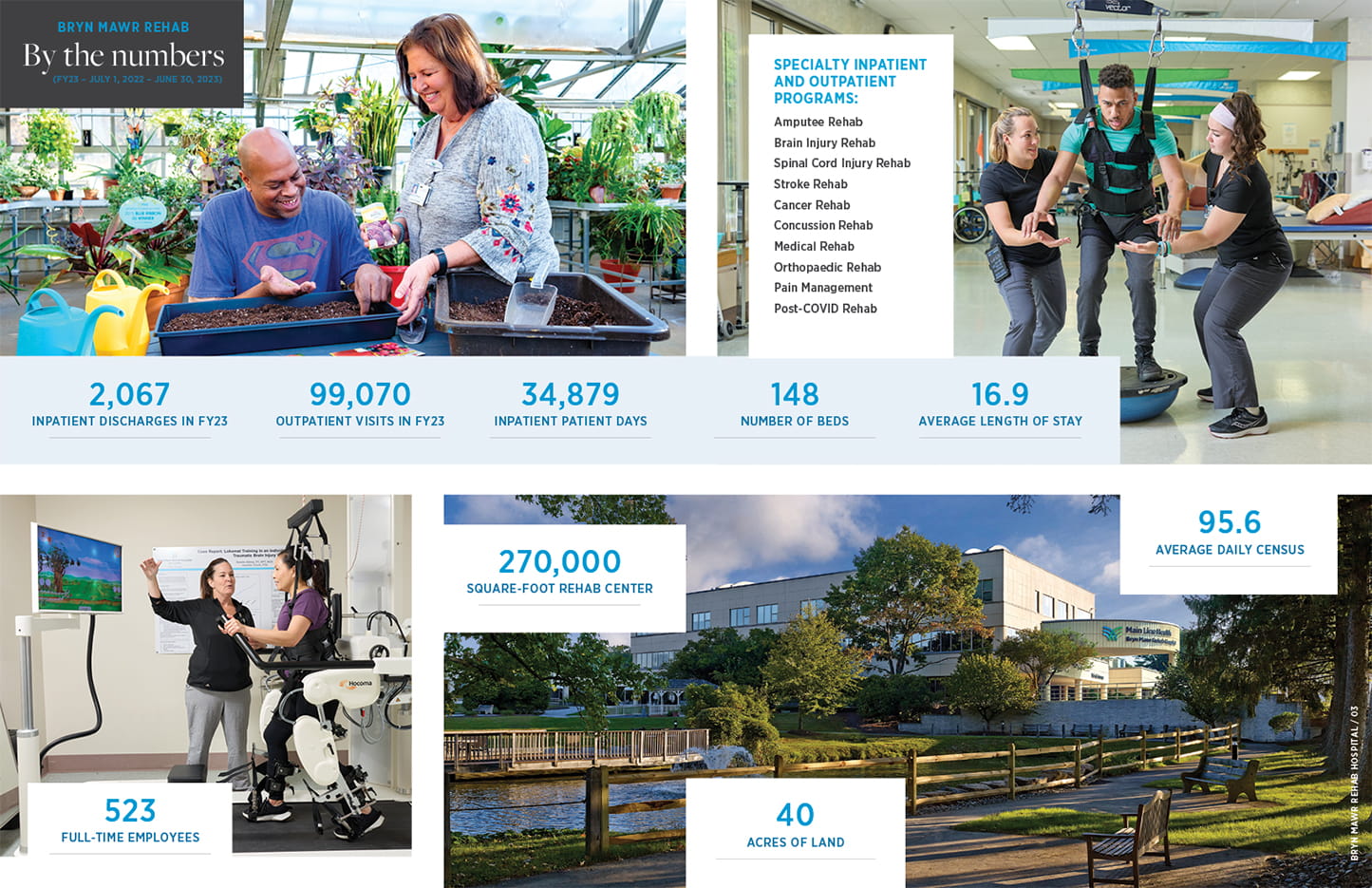
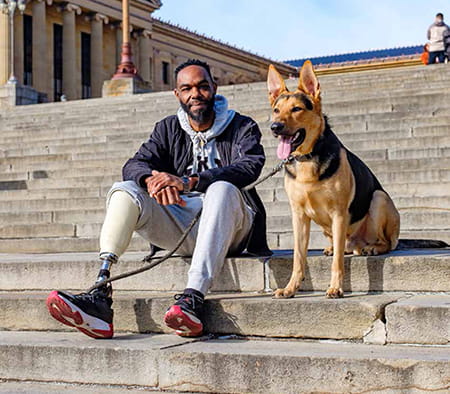
Rock Bottom to Rock Model: Thriving after an amputation
"I was at my lowest point in life when i showed up on Bryn Mawr Rehab hospital's doorstep," recalls Damon Thorn, a former restaurant manager and the single parent of a teenage daughter. "It was tears for breakfast every morning." That was April 2021, just after Damon's right leg was amputated below the knee as the result of an infection and complications from diabetes. Thanks to his hard work and the care he received at Bryn Mawr Rehab Hospital, Damon's not only back on both feet, he's using his experience as a springboard to inspire others.
"Bryn Mawr Rehab Hospital really opened my eyes up to how compassion and care can make a difference," he attests.
Acclaimed nursing staff
Patients and their families are continually impressed by the caliber and care of the nursing staff. "I get inundated with compliments and positive things that patients and families share about the nursing staff every day," notes Vice President for Patient Services Sharon Strohecker, DNP, RN, NE-BC. "I have a wonderful team here, and they do a fantastic job."
Rehabilitation nurses not only need to be skilled in the areas necessary for acute care nursing, but they also need to be well-versed in the specific needs of rehabilitation patients. Such needs may include special considerations when moving patients, addressing complications that are more likely to develop, and knowing how to help patients progress so they achieve their fullest recovery. As a means of professional growth, Bryn Mawr Rehab Hospital provides its nurses with the time and financial support to pursue their specialty certification as a rehabilitation nurse (CCRN). Currently, an impressive 60% of the nursing staff hold CCRN credentials or other certifications in their specialties.
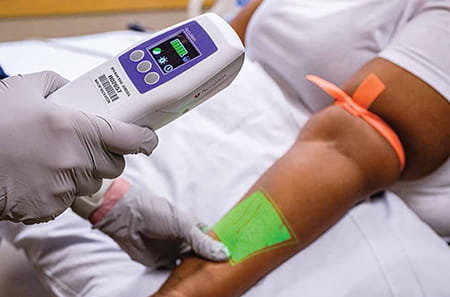
AccuVein comes to Rehab
To provide patients with the best possible care, Bryn Mawr Rehab Hospital equips the nursing staff with state-of-the-art tools and resources. This fall, the team began rolling out AccuVein AV500 technology, thanks to support from the Foundation. AccuVein is an ultrasound device that illuminates the veins in a patient's arm, making it easier to identify appropriate sites for inserting IVs and drawing blood.
The tool works well for all skin tones and will especially benefit patients who have darker skin or have had complicated or multiple phlebotomy or IV access attempts in the past, both factors that can make it more difficult to locate appropriate veins. As a result, all patients at Bryn Mawr Rehab Hospital can expect reduced pain and anxiety surrounding IVs and blood draws.
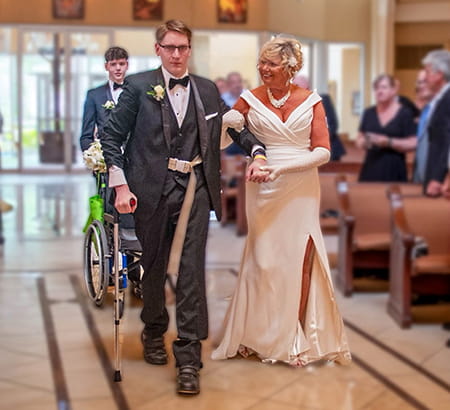
An incredible life ahead: Rebounding from a traumatic brain injury
On June 2, 2023, 25-year-old Cole Keith waited in his wheelchair halfway up the aisle of the church on his mother Marie's wedding day. His brother Kevin began walking Marie up the aisle, but when the pair reached Cole, they stopped. They helped Cole out of his wheelchair, and then — to everyone's amazement — Cole walked his mother the rest of the way.
"The whole church was crying," recalls Marie, who worked with Cole's homecare therapist to prepare for the surprise — one of many milestones on his remarkable recovery from a traumatic brain injury so severe that few in his situation even survive.
Just three months earlier, Cole had been involved in a tragic motorcycle accident while swerving to avoid a distracted driver. First responders rushed Cole to Paoli Hospital — Chester County's only trauma center — where the trauma team jumped into action to assess Cole's injuries. Despite wearing extensive safety equipment, Cole suffered nine brain bleeds, including one near his brain stem, nine broken bones, and two punctured lungs. He spent three and a half weeks in a Level 3 coma.
"Your son will never be the same," Marie remembers one doctor telling her. Family and friends prayed for a miracle. A few weeks later, Cole opened his eyes.
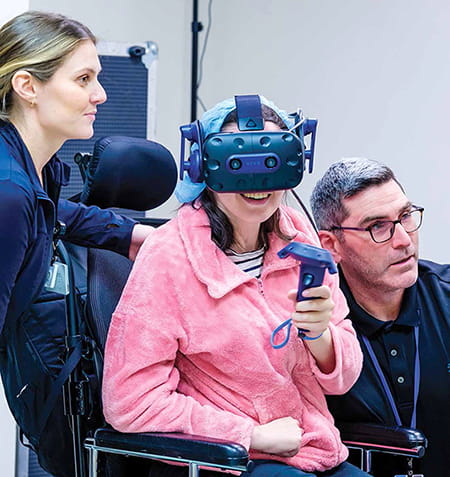
Virtualis VR Goggles
This summer, Bryn Mawr Rehab Hospital introduced the Virtualis Virtual Reality Rehabilitation Goggles, a cutting-edge tool to enhance treatment for conditions from traumatic brain injury and stroke to MS and chronic pain. "Virtualis VR is the most exciting technology that we've come across in a very long time," says Clare Small-McEvoy, PT, DPT, clinical director of therapy services for Main Line Health.
Virtualis VR transports patients to a virtual environment, free from the distractions of the hospital. Patients hold or stand on the device’s controllers while they engage in tasks and challenges that would otherwise require significant time and props to create in the real world. The technology enables therapists to fully customize the patient's session, quantify their ability to engage in specific complex movements, and motivate patients in fun and engaging new way.
Why choose Bryn Mawr Rehab Hospital
Deciding where to go for rehabilitation is a critical step in your recovery. At Bryn Mawr Rehab Hospital, we offer private tours of our facility and clinical liaisons who provide one-on-one consultations with patients and caregivers. Our patients receive the highest quality therapy, nursing and physician care with experts to guide them on their recovery journey.
As one of the most comprehensive rehabilitation hospitals in Pennsylvania, we take a creative approach to a wide range of rehabilitation services to help patients reestablish their lives. Our dedicated team creates custom therapy plans for each patient, building on every moment of triumph along the way. Celebrating this incremental progress keeps us — and our patients — driven to keep improving every single day. For this reason, Bryn Mawr Rehab Hospital is being chosen by patients and their families more than ever as their destination for recovery.
Learn more about Bryn Mawr Rehab
You may also download Bryn Mawr Rehab Hospital's Impact Report (PDF) to print and share with family and friends.